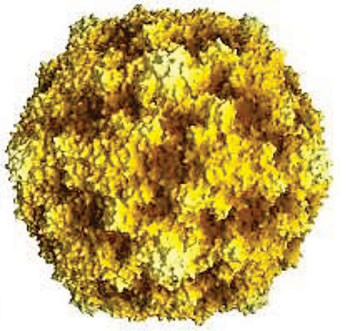Prenatal Viral Exposure May Cause Type 1 Diabetes
By LabMedica International staff writers
Posted on 22 Oct 2014
Women who contract a viral infection during pregnancy transmit viruses to their genetically susceptible fetuses, sparking the development of type 1 diabetes. Posted on 22 Oct 2014
The incidence of type 1childhood diabetes has been increasing rapidly worldwide and if blood sugar levels are not well-controlled, juvenile diabetes can affect nearly every organ of a child's body with long-term complications of the disease developing gradually that may become disabling and even life-threatening.

Image: View across the 2-fold icosahedral axis of the Coxsackievirus B3 (Photo courtesy of Jean-Yves Sgro).
Scientists at the Tel Aviv University Sackler Faculty of Medicine (Tel Aviv, Israel) and their colleagues conducted blood tests of 107 healthy pregnant women, testing for islet cell autoantibodies which are evidence of diabetes that appears years before the initial symptoms. Maternal and cord blood sera from the pregnant women were tested for islet cell autoantibodies using radioligand binding assays and for anti-Rotavirus and anti-Coxsackievirus B3 (CoxB3) antibody using an enzyme-linked immunosorbent assay during different seasons.
The scientists found a striking difference between women tested in different seasons, suggesting a link to winter epidemics. The concurrent presence of glutamic acid decarboxylase (GAD65) antibodies in cord blood and their mothers indicated autoimmune damage to islet cells during gestation, possibly caused by cross-placental transmission of viral infections and/or antivirus antibodies. In other words, during viral epidemics of winter months, 10% of the healthy pregnant women who had no family background of autoimmune diseases tested positive for damaging antibodies.
For 5, 22 and 17 pregnancies, antibodies to GAD65, Rotavirus and CoxB3, respectively, were detected in cord blood only and not in the corresponding maternal serum. In 10 pregnancies, Rotavirus antibody titers in the cord blood exceeded those in the corresponding maternal serum by 2.5 to 5-fold. Increased antibody titers after the 20th week of gestation suggested CoxB3 infection in one of the 20 pregnancies and Rotavirus in another.
Zvi Laron, MD, professor emeritus of pediatric endocrinology and senior author of the study said, “If our hypothesis can be verified, then preventive vaccine before conception would be useful in stopping the increasing incidence of type 1 diabetes and other autoimmune diseases. There is no cure for this diabetes, so true intervention would be important not only medically but also psychologically and financially, as the costs of the lifelong treatment of this chronic disease and other autoimmune diseases are great.” The study was published in the June 2014 issue of the journal Diabetic Medicine.
Related Links:
Sackler Faculty of Medicine













